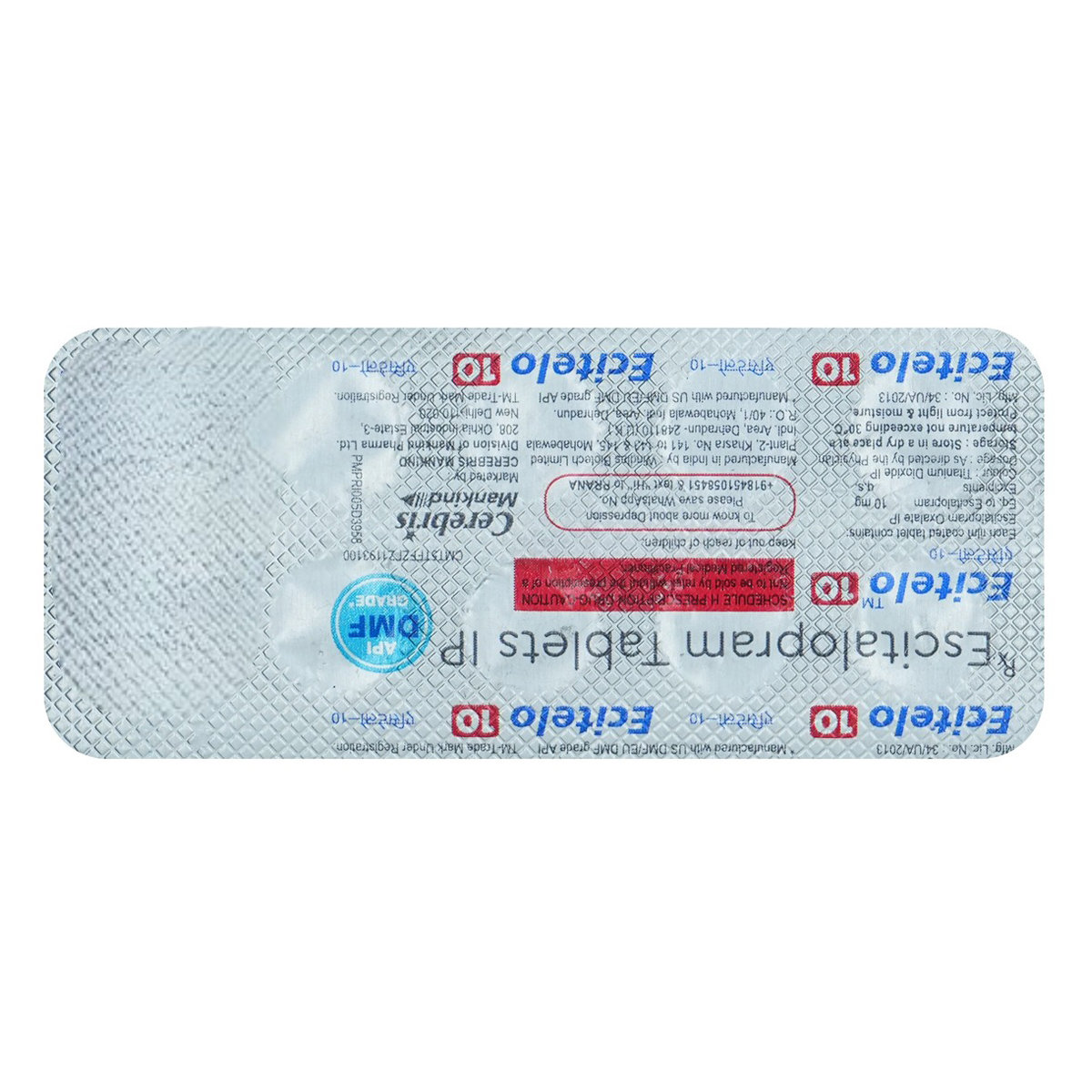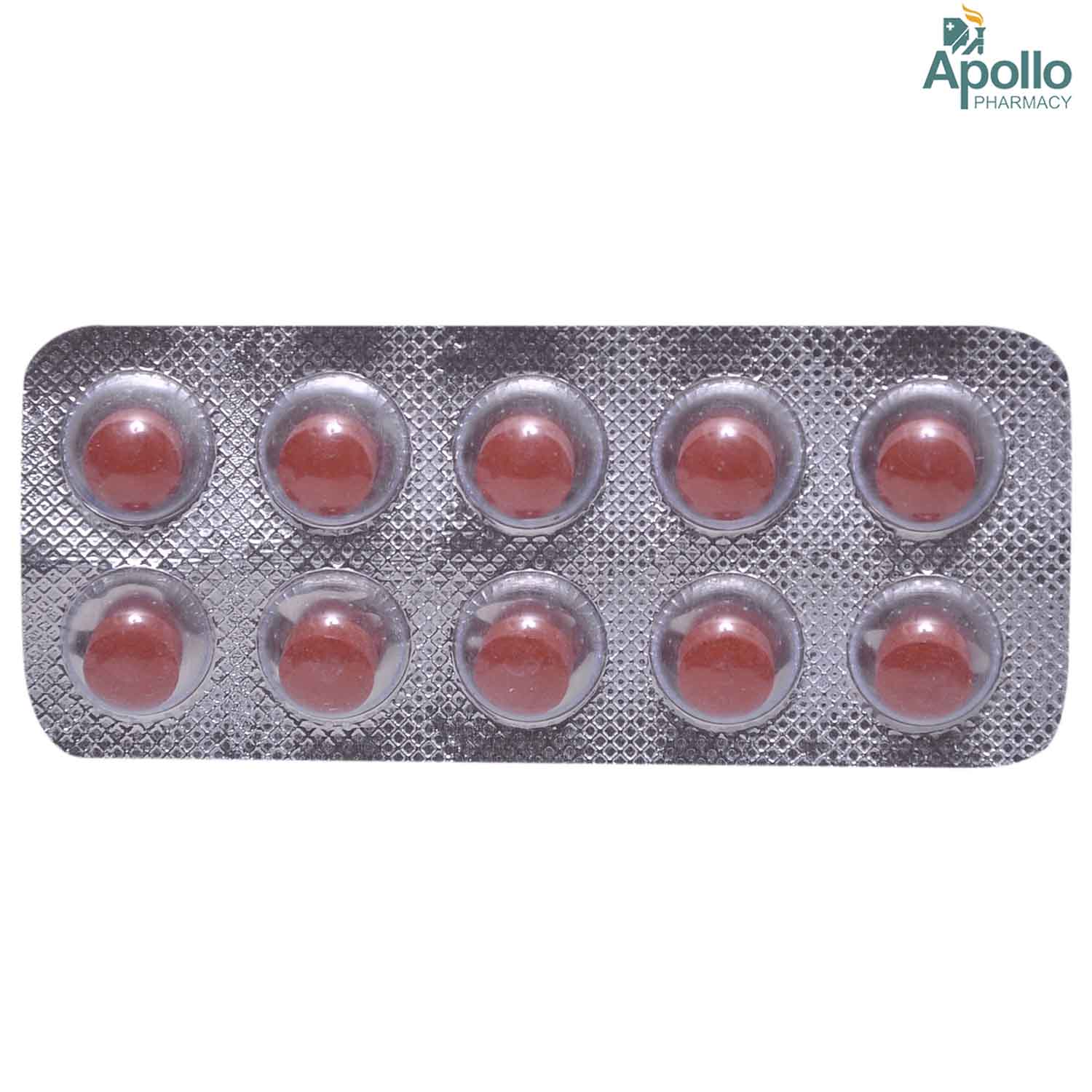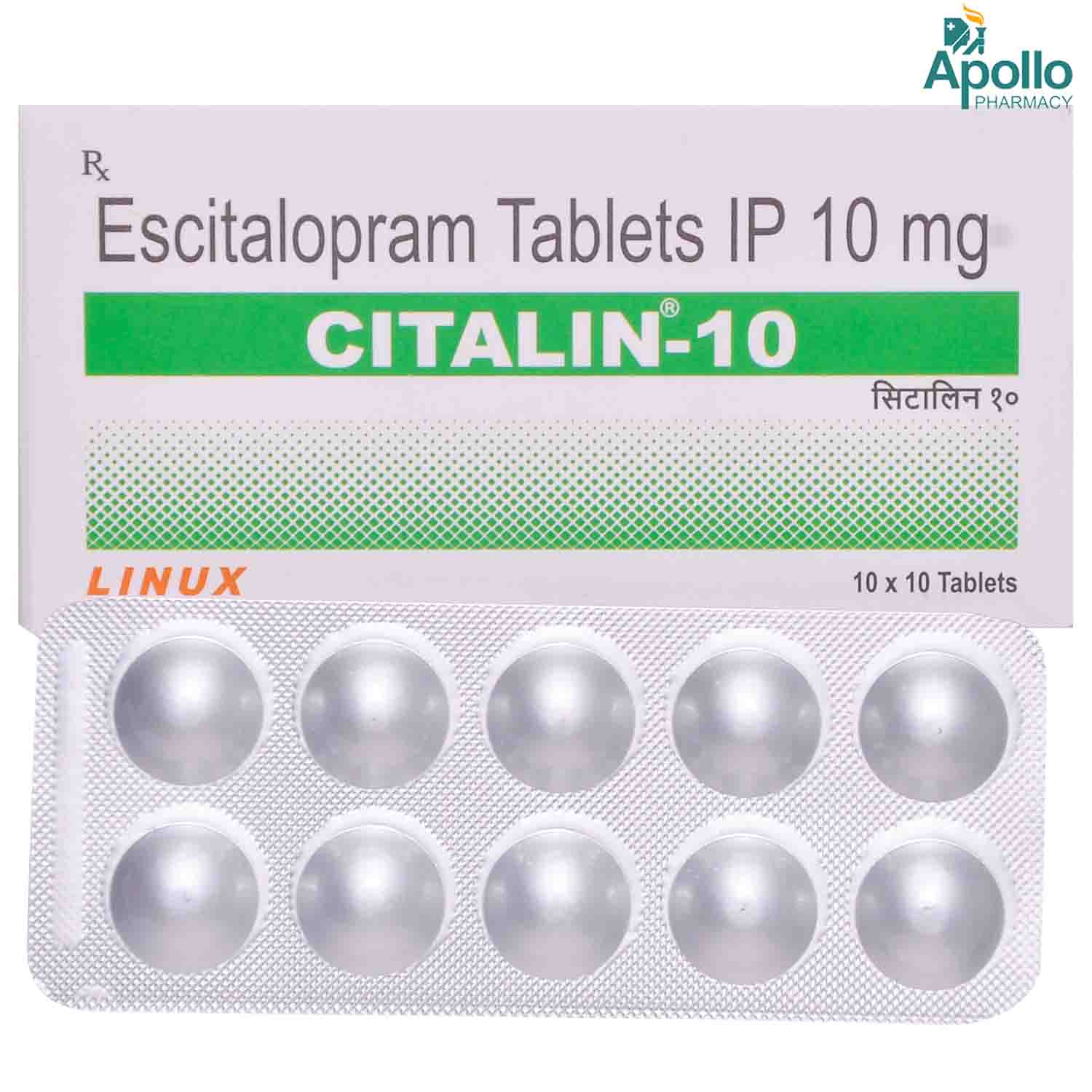S Citapad 10 Tablet 10's
MRP ₹75
(Inclusive of all Taxes)
₹11.3 Cashback (15%)
Provide Delivery Location

secured payment

india's most trusted pharmacy

genuine products
Composition :
Manufacturer/Marketer :
Consume Type :
Expires on or after :
Return Policy :
NPPA :
About SCITAPAD 10MG TABLET
SCITAPAD 10MG TABLET is a type of antidepressant which belongs to the class of selective serotonin reuptake inhibitors (SSRI) and is primarily used in the treatment of depression and other mental health conditions which include anxiety, panic disorder, and obsessive-compulsive disorder. Depression is a mood disorder that affects day to day life of a person. A person may have symptoms such as feeling sad or feeling of loss and might have mood swings. Anxiety is defined as an emotion that is characterized by feelings of tension, worried thoughts, and symptoms like increased blood pressure. Anxiety disorder also includes panic disorder which is characterized by sudden feelings of terror. In Obsessive-compulsive disorder (OCD), a person feels the need to think or perform things repeatedly.
SCITAPAD 10MG TABLET works by increasing serotonin levels. Serotonin is a chemical messenger in the brain which is responsible for improving the mood and physical symptoms of depression. It is also responsible for relieving symptoms of anxiety, panic attacks, and obsessive-compulsive disorders.
You can take SCITAPAD 10MG TABLET with or without food. It should be swallowed whole with a glass of water. Do not chew, bite, or break it. Your doctor will advise you on how often you take your tablets based on your medical condition. In some cases, you may experience a decreased or increased appetite, weight gain, pain, sweating, fatigue, or high fever. Most of these side effects of SCITAPAD 10MG TABLET do not require medical attention and gradually resolve over time. However, if the side effects are persistent, reach out to your doctor.
Try not to stop taking SCITAPAD 10MG TABLET of your own as it may lead to unpleasant side effects. Let your doctor know about this, as it may cause withdrawal symptoms. let your doctor know if you have epilepsy (seizure disorder or fits), diabetes, liver or kidney disease, any heart problems, or are currently taking medicines for depression known as MAO inhibitors (such as Isocarboxazid, Phenelzine, Selegiline) or problems with alcohol or other prescription drugs. These may affect your treatment also Inform your doctor if you are allergic to SCITAPAD 10MG TABLET.
Uses of SCITAPAD 10MG TABLET

Have a query?
Directions for Use
Key Benefits
SCITAPAD 10MG TABLET is a type of antidepressant which belongs to the class of selective serotonin reuptake inhibitors (SSRI) and is primarily used in the treatment of depression and other mental health conditions which include anxiety, panic disorder, and obsessive-compulsive disorder. SCITAPAD 10MG TABLET works by increasing serotonin levels. Serotonin is a chemical messenger in the brain which is responsible for improving the mood and physical symptoms of depression. It is also responsible for relieving symptoms of anxiety, panic attacks, and obsessive-compulsive disorders.
Storage
- Inability to have an orgasm can be managed by treating any underlying medical condition that has not been diagnosed.
- Observe yourself and try to understand why this inability occurs.
- Regularly do strengthening exercises to improve blood flow throughout the body to improve your desire.
- Implement massage techniques to enhance blood flow to organs.
- Take a balanced diet and quit smoking.
- Practice yoga and meditation to improve thought processes and have cognitive behavioural therapy.
Drug Warnings
Taking SCITAPAD 10MG TABLET should be avoided in patients having epilepsy (Brain disorder in which brain activity becomes abnormal, causing seizures), impaired liver or kidney function, diabetes, decreased level of sodium in the blood, tendency to easily develop bleedings or bruises, patients receiving electroconvulsive treatment, having coronary heart disease, suffering or have suffered from heart problems or have recently had a heart attack, having a low resting heart-rate, prolonged severe diarrhoea, and vomiting (Being sick) or using diuretics (water tablets), experiencing a fast or irregular heartbeat, fainting, collapse, or dizziness on standing up, which may indicate abnormal functioning of the heart rate, having or previously had eye problems, such as certain kinds of glaucoma (increased pressure in the eye).
Drug-Drug Interactions
Drug-Drug Interactions
Login/Sign Up
Taking Ketoconazole and S Citapad 10 Tablet together can increase the risk of abnormal heart rhythm.
How to manage the interaction:
Taking Ketoconazole and S Citapad 10 Tablet together can result in an interaction, it can be taken if a doctor has advised it. However, if you experience sudden dizziness, lightheadedness, fainting, shortness of breath, or rapid heartbeat, consult a doctor immediately. Do not stop using any medications without talking to a doctor.
Taking chlorpromazine and S Citapad 10 Tablet together can increase the risk of abnormal heart rhythm.
How to manage the interaction:
Taking chlorpromazine and S Citapad 10 Tablet together can possibly result in an interaction, it can be taken if your doctor has advised it. However, if you experience sudden dizziness, lightheadedness, fainting, shortness of breath, or rapid heartbeat, contact your doctor. Do not discontinue any medications without consulting your doctor.
Using S Citapad 10 Tablet together with Moxifloxacin can increase the risk of an irregular heart rhythm.
How to manage the interaction:
Taking Moxifloxacin with S Citapad 10 Tablet together can result in an interaction, but it can be taken if a doctor has advised it. However, if you experience dizziness, shortness of breath, or irregular heartbeat, contact a doctor right away. Do not discontinue any medications without consulting a doctor.
When Pazopanib is taken with S Citapad 10 Tablet it can increase the risk of an irregular heart rhythm.
How to manage the interaction:
Co-administration of Pazopanib with S Citapad 10 Tablet can possibly result in an interaction, but it can be taken if your doctor has advised it. However if you experience sudden dizziness, lightheadedness, fainting, shortness of breath, or heart palpitations, consult the doctor immediately. Do not discontinue any medications without first consulting your doctor.
Combining Furazolidone with S Citapad 10 Tablet can increase the risk of serotonin syndrome.
How to manage the interaction:
There may be a possibility of interaction between S Citapad 10 Tablet and Furazolidone, but it can be taken if prescribed by a doctor. Do not stop using any medications without talking to your doctor.
Taking rasagiline with S Citapad 10 Tablet can increase the risk of serotonin syndrome (A condition in which a chemical called serotonin increase in your body).
How to manage the interaction:
Taking S Citapad 10 Tablet with Rasagiline together can possibly result in an interaction, they can be taken together if prescribed by a doctor. However, consult a doctor if you experience confusion, hallucinations (seeing and hearing things that do not exist), fits, blood pressure alteration, increased heart rate, fever, excessive sweating, shivering or shaking, blurred vision, pain in the muscles or stiffness, stomach cramps, nausea, vomiting, and loose stools. Do not discontinue any medications without consulting a doctor.
When venlafaxine is combined with S Citapad 10 Tablet, it may increase the risk of serotonin syndrome (a condition in which a chemical called serotonin increases in your body).
How to manage the interaction:
Although there is an interaction between S Citapad 10 Tablet and Venlafaxine, they can be taken together if prescribed by a doctor. However, consult a doctor if you experience confusion, hallucinations (seeing and hearing things that do not exist), fits, blood pressure alteration, increased heart rate, fever, excessive sweating, shivering or shaking, blurred vision, pain in the muscles or stiffness, incoordination, stomach cramps, nausea, vomiting, and diarrhea. Do not discontinue any medications without consulting your doctor.
Combining Rizatriptan with S Citapad 10 Tablet can increase the risk of serotonin syndrome (A condition in which a chemical called serotonin increase in your body).
How to manage the interaction:
Although there is a possible interaction between S Citapad 10 Tablet and Rizatriptan, it can be taken if your doctor has advised it. If you notice any of these symptoms like confusion, hallucination, fits, extreme changes in blood pressure, increased heart rate, fever, excessive sweating, shivering or shaking, blurred vision, muscle spasm or stiffness, shaking of hands and legs, incoordination, stomach cramps, nausea, vomiting, and loose stools, contact a doctor. Do not discontinue any medications without consulting a doctor.
Taking Lithium together with S Citapad 10 Tablet can increase the risk of an irregular heart rhythm.
How to manage the interaction:
Taking S Citapad 10 Tablet with Lithium together can possibly result in an interaction, but it can be taken if your doctor has advised it. However, consult the doctor immediately if you experience symptoms such as dizziness, lightheadedness, fainting, shortness of breath, or heart palpitations. Do not stop using any medications without consulting doctor.
Combining Degarelix with S Citapad 10 Tablet can increase the risk of QTc prolongation.
How to manage the interaction:
Taking Degarelix with S Citapad 10 Tablet together can possibly result in an interaction, but it can be taken if your doctor has advised it. If you experience any symptoms like dizziness, fainting, or abnormal heart rhythm, contact your doctor immediately. Do not stop using any medications without a doctor's advice.
Drug-Food Interactions
Drug-Food Interactions
Login/Sign Up
Diet & Lifestyle Advise
- Doing regular exercise can help lower anxiety by releasing endorphins and improving sleep.
- Find humour in your daily life. Try to watch light-hearted shows to help relieve stress.
- You can try increasing your mindfulness by including yoga, meditation, cognitive therapy, and mindfulness-based stress reduction.
- Drink enough water to stay hydrated, and limit or avoid alcohol and caffeine to relieve anxiety.
- Include a diet rich in whole grains, vegetables, and fruits. This is a healthier option than eating many simple carbohydrates in processed foods.
- Herbs like turmeric, ginger, and chamomile contain anti-inflammatory properties. Including these stuff in meals can reduce inflammation caused due to anxiety disorder.
- Reduce your alcohol, caffeine, added sugar, high salt, and high fat intake. Significantly transfat may help also help reduce inflammation.
- You can include antioxidants in your daily diet, like ashwagandha, omega-3 fatty acids, green tea, and lemon balm.
- Try to spend time with your friends and family. Having a solid social network may help you lower your risk of anxiety.
Habit Forming
Therapeutic Class
All Substitutes & Brand Comparisons
RX
Ecitelo 10 Tablet 10's
Mankind Pharma Pvt Ltd
₹83.5
(₹7.52 per unit)
11% COSTLIERRX
Escigress-10 Tablet 10's
La Renon Healthcare Pvt Ltd
₹90
(₹8.1 per unit)
19% COSTLIERRX
Citalin-10 Tablet 10's
Linux Laboratories Pvt Ltd
₹94
(₹8.27 per unit)
22% COSTLIER
Alcohol
Safe if prescribed
It is not recommended to take alcohol with SCITAPAD 10MG TABLET to avoid unpleasant side-effects.
Pregnancy
Consult your doctor
SCITAPAD 10MG TABLET is not recommended in pregnancy. However, if you were already taking this medicine before becoming pregnant, do not stop taking it without consulting your doctor. It can pose a small risk of problems for an unborn baby. Your doctor might prescribe you this medicine in pregnancy depending upon your condition as it is important to stay well in pregnancy.
Breast Feeding
Consult your doctor
SCITAPAD 10MG TABLET passes into breast milk in very small amounts and might cause side effects in breastfed babies. It can be prescribed if the baby is healthy. However, if after taking SCITAPAD 10MG TABLET, the baby isn't feeding well as usual, or is sleeping a lot than normal, please consult your doctor.
Driving
Safe if prescribed
It is not recommended to drive after taking SCITAPAD 10MG TABLET as it may cause drowsiness and interfere with your driving ability.
Liver
Consult your doctor
SCITAPAD 10MG TABLET to be taken with caution, especially if you have a history of liver diseases/conditions. The dose may have to be adjusted by your doctor.
Kidney
Consult your doctor
SCITAPAD 10MG TABLET to be taken with caution, especially if you have a history of kidney diseases/conditions as dose adjustment might be required.
Children
Safe if prescribed
SCITAPAD 10MG TABLET is not recommended in children below 12 years of age.
FAQs
It takes about 2-4 weeks before you start feeling better. It is advised not to stop this medicine without consulting your doctor as may lead to unpleasant side-effects.
SCITAPAD 10MG TABLET is not advised in cases if a person is allergic to SCITAPAD 10MG TABLET, has epilepsy, or are having electroconvulsive treatment as SCITAPAD 10MG TABLET may increase your risk of having a seizure. SCITAPAD 10MG TABLET should not be taken by a person having heart problems as taking SCITAPAD 10MG TABLET can speed up or change the heartbeat. It should not be given to a person having a low heart rate along with symptoms of diarrhoea and vomiting, pregnant women, trying to get pregnant, breastfeeding, having eye problems such as glaucoma. In diabetics, it can cause difficulty in keeping stable blood sugar levels.
SCITAPAD 10MG TABLET should be preferably taken in the morning as taking it at night can keep you awake till late. It is better to take it at a fixed time.
Certain side-effects of SCITAPAD 10MG TABLET can be dealt with simple tips such as if you experience dry mouth, you can chew sugar-free gum or take sugar-free sweets. If you are sweating a lot while taking SCITAPAD 10MG TABLET, wear loose clothing, and use a strong antiperspirant. If you are unable to sleep after taking SCITAPAD 10MG TABLET, prefer to take it in the morning to avoid sleep disturbances. If you feel sleepy after taking SCITAPAD 10MG TABLET, avoid taking it in the evening and limit your alcohol intake. If you feel tired or weak after taking SCITAPAD 10MG TABLET, sit or lie down until you feel better. If you feel that the side-effects are worsening, please consult your doctor.
Taking SCITAPAD 10MG TABLET in more than the recommended dose can cause unpleasant side-effects such as dizziness, tremor, agitation, convulsion, coma, nausea, vomiting, changes in heart rhythm, decreased blood pressure, and change in body fluid/salt balance.
Initially, SCITAPAD 10MG TABLET can make you feel less hungry which can make you lose weight. After some days, you might gain weight as your appetite returns. If you experience too much weight loss or gain, please consult your doctor.
Yes, SCITAPAD 10MG TABLET might cause memory problems along with headache, confusion, trouble concentrating, weakness, or unsteadiness.
SCITAPAD 10MG TABLET should be taken as per the advice of your doctor. Once you start feeling better, you might have to continue it for several months to prevent the symptoms from returning back. Your doctor will advise you on how much time you need to continue SCITAPAD 10MG TABLET depending upon the type and severity of your symptoms.
In case you miss a dose of SCITAPAD 10MG TABLET, do not take a double dose of SCITAPAD 10MG TABLET. If you remember the missed dose before sleeping, take it at that time and take SCITAPAD 10MG TABLET at the same time the next day which were you taking earlier. If you remember the missed dose the next day, leave the skipped dose, and continue with the next dose.
Yes, it is very important to inform your doctor if you are planning to get pregnant and are taking SCITAPAD 10MG TABLET. It is not advised to take this medicine in pregnancy as it might pose a risk to the unborn baby. However, please consult your doctor before you stop taking SCITAPAD 10MG TABLET as the sudden stoppage of this medicine can lead to unpleasant side-effects.
Country of origin
Manufacturer/Marketer address
Disclaimer
Reference
- https://www.medicines.org.uk/emc/product/4307/smpc#gref
- https://www.medicines.org.uk/emc/files/pil.4307.pdf
- https://www.nhs.uk/medicines/escitalopram/
- https://www.mayoclinic.org/drugs-supplements/escitalopram-oral-route/side-effects/drg-20063707?p=1#:~:text=Check%20with%20your%20doctor%20right,thinking%20or%20controlling%20body%20movements.







